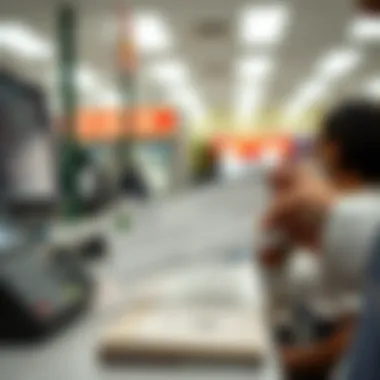Where to Cash Out a Check: Your Complete Guide


Intro
Cashing a check can seem like a walk in the park, but behind that simplicity lies a web of options, costs, and requirements that many folks may not consider. From using your local bank to hitting up a check-cashing service, there’s no one-size-fits-all answer for how to get your cash. This guide aims to break down those various paths, laying out the pros and cons alongside vital factors like fees and what identification you’ll need to bring along.
Whether you’re a first-time check cashing novice or someone looking to optimize how you handle your finances, the details in this article will steer you through the maze. By the end, you should feel equipped to make the most suitable choice for your financial needs, ensuring a smooth cash-out experience.
Understanding Different Options
Exploring where you can cash a check means understanding the type of check you have, be it payroll, government, or personal. Each option comes with its own set of rules and requisites. Let's dive into the big players:
Banks and Credit Unions
Banks remain the gold standard for cashing checks, providing the added benefits of credit management and, often, lower fees. Here are a few points to consider:
- Fees: Most banks don’t charge their account holders to cash a check, although fees can apply for non-account holders ranging from $5 to $10.
- Identification: Usually need to show a valid ID, like a driver's license or passport. Be ready for your bank to require a fingerprint.
- Processing Time: Fast, often immediate if you're a member. For non-customers, it may take longer as the bank will need to verify funds.
Check-Cashing Services
These places are often open longer than banks and cater to those needing quick access to their funds. Think of convenience, but beware of high costs:
- Fees: Typically higher than banks, around 1-5% of the total check amount. Make sure you calculate just how much you'll lose on the transaction.
- Identification: Most will expect you to show a government-issued ID. Some may also require social security numbers or addresses.
- Speed: Instant cash in hand, a significant upside when you're in a pinch.
Retail Stores
Some larger retail chains, like Walmart or supermarkets, also cash checks. This option can be useful with added flexibility:
- Fees: Lower than check-cashing services, usually around $3-$6 depending on the check amount.
- Identification: Same as above; a government ID is often necessary.
- Convenience: Many stores have extended hours, making it easier to catch them after work.
Mobile Apps and Online Options
Living in the digital age, some mobile apps and online platforms are emerging as alternatives. These can simplify processes:
- Fees: Fees vary but often include a flat fee or a percentage based on the check total.
- Identification: Usually, a scanned ID and the check image are needed. Always check app reviews for reliability.
- Processing Time: This can be a waiting game, with cash sometimes taking 1-3 business days to appear in your account.
Takeaway: Knowing your options empowers you. Each method presents distinct characteristics that fit different financial situations.
Understanding where and how to cash your check is crucial not just for quick access to funds but for financial literacy. Next, we will analyze the fees in more detail, helping you to make informed choices.
Understanding the Basics of Check Cashing
Cashing a check might seem like an uncomplicated task, but there are several important aspects that one must grasp to navigate this process effectively. The act of cashing a check involves understanding the types of checks, the required identification, and the various locations where this can be accomplished. Knowing these factors greatly influences the efficiency and reliability of the transaction.
Types of Checks Available for Cashing
Personal Checks
Personal checks are one of the most common types of checks encountered in daily financial interactions. These checks are written by an individual and drawn from their bank account. A key characteristic of personal checks is that they are often issued between parties who know each other, like family or friends, which can make them more personable. However, one disadvantage is that they may not be accepted everywhere due to the risk of insufficient funds. It’s essential to ensure that funds exist in the account before cashing these checks to avoid complications.
"Personal checks show trust between parties but come with their own risks, especially if there's uncertainty about funds."
Payroll Checks
Payroll checks are issued by an employer to pay their employees. These checks carry a certain level of security because they usually include standard identification features that help prevent fraud. A significant advantage of payroll checks is that they are often guaranteed, making them a favored choice among cashing outlets. Additionally, many banks will cash these checks without stringent requirements, as they represent earned income.
Government Checks
Government checks, such as Social Security, tax refunds, or veteran benefits, are issued directly by government entities. One important aspect of these checks is that they typically come with strict security features and are guaranteed by the government, making them a reliable form of income. Cashing these checks usually incurs fewer fees compared to other types, making it beneficial for individuals needing quick access to cash.
Cashier's Checks
A cashier's check is a check guaranteed by a bank, drawing on the bank's own funds. This makes them safer to cash than personal checks, as there is less risk of bounced checks. The point of being a popular option is that they are often used for large transactions, such as purchasing a car or a home. However, one must be cautious because cashier's checks can also be faked, so ensuring legitimacy is crucial before cashing.
The Importance of Identification
Common Identification Forms
Identification serves as a crucial element in the check-cashing process. Common forms include government-issued IDs like driver's licenses or passports. Presenting valid identification not only ensures compliance with banking regulations but also protects both the cashing party and the check holder from identity theft or fraud. For individuals unfamiliar with this process, it's a vital step to understand that having the right ID can significantly streamline cashing checks.
Considerations for Minor or Non-Citizen Cashing
Cashing checks can be complicated for minors or non-citizens. One must keep in mind that regulations vary widely depending on the state and the bank involved. Minors might require parental consent, while non-citizens may need to present additional documentation, such as a visa. Knowing these nuances beforehand can save a lot of time and potential issues when trying to cash a check.
Digital Identification in Modern Transactions
With the rise of technology, digital identification is becoming more commonly accepted in the check-cashing landscape. Mobile apps and online banking services often use biometric authentication or secure login protocols to streamline the process. This development is especially convenient, allowing fast transactions without needing to carry physical identification. However, one should be vigilant about security, as digital systems can also present risks if not managed properly.
Cashing a Check at Banks
Cashing a check at banks is often considered one of the safest and most reliable options available. Unlike check-cashing services that may charge higher fees, banks typically offer this service as part of their communal care for customers. However, cashing a check at a bank isn’t just about getting cash in your hand; it also entails being familiar with various nuances as one navigates these financial waters. With identification requirements, fees, and specific policies, understanding how to approach this option is key to maximizing convenience while minimizing potential pitfalls.
Using Your Bank's Services
Requirements for Existing Customers
The requirements for existing customers at banks often lay out the groundwork for a seamless experience. With a bank account already established, clients can cash their checks with less hassle. Most commonly, a valid photo ID along with the checks typically suffice, laying a familiar path down to the cash counter. This key characteristic of pre-existing relationships with a bank provides an air of legitimacy and ease, drawing in customers who wish to avoid long lines or additional fees. The unique feature here is how a simple deposit can turn into instant cash, empowering individuals to manage their finances almost fluidly.
Non-Member Transactions
Now what happens if you don’t have an account at the bank? Non-member transactions are indeed a practical lifeline for those caught without established banking ties. Most banks allow you to cash checks, but there will be conditions involved. A valid ID is paramount, and often these non-member services come with a fee. Despite this, many find this option beneficial, especially in emergencies. It presents a back-up plan for accessing money quickly, addressing a dire need even though it might involve a slight financial sacrifice.


Potential Fees Involved
Speaking of costs, it’s crucial to shine a light on potential fees that can crop up while cashing a check at a bank. Fees can range widely based on the financial institution’s policies and the type of check presented. Some banks might even waive fees for account holders – yet for others, it can become an unexpected expense. For instance, cashing a payroll or government check might come at a lower price than a personal check. Staying aware of these fees is important; thus, factoring them into your decision-making cannot be overstated.
Finding a Nearby Bank
With the myriad of options at your disposal, you might wonder: how do I find a bank that fits my needs?
Utilizing Online Tools
Utilizing online tools for checking bank locations has transformed the way we approach financial transactions. Banks often have dedicated apps and websites that can direct you to the nearest branches equipped to handle check cashing. These tools not only show physical addresses but also provide operating hours and remaining wait times at certain locations, significantly simplifying the cash-out process. This convenience can’t be overlooked since it keeps you informed even while you’re on the go.
Locating Branches by Service Offered
Another vital aspect of finding a bank is knowing what services they provide, especially when it comes to cashing checks. Some branches may specialize in different services or cater to certain types of checks more readily. Knowing this can save time and prevent unnecessary trips. Often, banks list these details on their websites, allowing potential customers to sift through options—making the task less like a needle-in-a-haystack scenario and certainly more streamlined.
Operating Hours Considerations
Last but not least, operating hours considerations can play a significant role in the cashing experience. Not every bank branches operates on a 9 to 5 schedule. Many banks may extend their hours into the evenings or open earlier on weekends. Catching this information early can make a significant difference, ensuring you're not left standing at a closed door. Don't forget that some branches may be busier than others; planning your visit can help avoid detours or delays, especially if you’re cashing a check on a tight schedule.
Remember, proper planning and awareness of your bank's policies can elevate your check cashing experience and minimize potential roadblocks.
Exploring Check-Cashing Services
Cashing checks at specialized outlets can sometimes be a convenient, flexible option for individuals looking to access their funds quickly. While banks are often the go-to places for cash exchanges, check-cashing services can offer distinct benefits that merit exploration. These services can cater to those who might not have a traditional bank account or simply prefer the ease of direct cash transactions at their fingertips.
Overview of Check-Cashing Outlets
Types of Services Offered
Check-cashing outlets typically present a variety of services that can fulfill numerous financial needs. Apart from simply cashing checks, they might also offer money orders, wire transfers, and bill payment services. The key characteristic here is versatility. For individuals who might not be familiar with banking processes, these outlets provide a more straightforward approach, often negating the need for extensive bureaucratic steps.
A unique feature of these services is the instant cash availability. Instead of waiting for a check to clear at a bank, customers may walk in with a check and walk out with cash in hand—often within minutes. This immediacy can prove to be invaluable for those who require immediate liquidity for day-to-day expenses. However, potential downsides include higher fees compared to standard banks, which could prompt financial strain if cashing checks regularly.
Geographical Spread of Services
The geographical distribution of check-cashing services significantly enhances accessibility for consumers. These services are usually sprouted around urban and suburban areas, strategically located for easy access. In many cases, you might find them where you least expect, such as near busy shopping districts or alongside convenience stores.
The widespread presence of check-cashing outlets can lessen the hassle for those without transportation or in rural areas. However, there’s a caveat: with the convenience of location comes the possibility of encountering a variety of service standards. Some places might not follow the same procedures and regulations as established banks, raising flags about reliability and security.
Understanding Service Fees
Delving into the realm of check-cashing services wouldn’t be complete without analyzing service fees. This aspect can vary widely among different outlets and locations. Fees often depend on check types and amounts, with a general trend of charging a percentage of the check amount. The average fee ranges from 1% to up to 10%, depending on the service's location and your check's nature.
A crucial characteristic to note is transparency. Many reputable check-cashing services will display their fee structures prominently, ensuring customers know what to expect before concluding their transaction. But be cautious—some businesses might slip in hidden charges or additional fees. This necessitates thorough research into service providers, as the true cost can sometimes be veiled until post-transaction.
Key Considerations When Using These Services
Service Reliability
When tapping into check-cashing services, reliability remains paramount. Not all outlets maintain the same level of professionalism. Some are reputable and operate transparently, while others may engage in shady practices. Customer reviews and ratings can be a gold mine for determining which local shops are trustworthy.
A notable aspect is the operational legitimacy of these services. Established outlets often adhere to certain regulations, ensuring they are licensed and in compliance with state laws. Customers should verify this information before proceeding with cashing checks. Otherwise, they could risk scams or difficulties in retrieving funds.
Convenience Versus Cost
Considering convenience against cost often plagues those choosing check-cashing services. If immediate access to funds is the priority, these services can be a lifesaver. However, the fees associated could eat into your wallet over time, especially for frequent use. This creates a tug-of-war between the need for quick cash and being frugal.
It's beneficial to weigh options carefully. If cashing checks is a rare necessity, a check-cashing service could be viable; if it’s a regular occurrence, establishing a relationship with a local bank might prove more cost-effective. The best solution usually involves a little planning and foresight, ensuring customers don’t end up digging deeper into their pockets than originally intended.
Regulatory Compliance Aspects
When using check-cashing services, it's imperative to understand the regulatory compliance aspects at play. Each state has different laws governing how these outlets operate. Reliable check-cashing services should fully comply with these regulations to protect both the business and its customers.
For example, some states require check-cashing outlets to register with specific agencies, maintain certain insurance levels, and adhere to anti-money laundering laws. A key advantage here is that compliance ensures safeguarding consumer rights, providing a cushion against fraud and malpractice. However, if you stumble into a non-compliant outlet, it poses risks. Therefore, the due diligence rests upon the customer to ensure they’re cashing their checks in a safe, regulated environment.
Retail Stores Offering Check Cashing
Cashing checks at retail stores can be a boon for those who seek convenience and accessibility. These establishments cater to a wide range of customers, offering a more flexible approach to check cashing compared to traditional banks. This section will explore the various retail options available and highlight their unique features and considerations.
Common Retail Locations
Supermarkets
Supermarkets are among the most common places where individuals can cash checks without the necessity of waiting in long lines typical of banks. Many chain supermarkets have set up banking kiosks that allow customers to cash checks on-site quickly and efficiently.
What often makes supermarkets a beloved option is their extended hours. Unlike banks that close early, many supermarkets stay open late or even 24/7, ensuring that people can cash their checks at their convenience, after a long day at work or during the weekend. Additionally, the trip to cash a check might just coincide with grocery shopping, which saves time and minimizes hassle.
However, there a few downsides. Not all supermarkets offer the same services, and you might find varying fee structures depending on the store. Customers need to be cautious and understand that fees charged for check cashing at supermarkets can sometimes be higher than at banks or credit unions.
Convenience Stores
Convenience stores, often found in various neighborhoods, provide another user-friendly option for cashing checks. They are especially beneficial for individuals who might not have easy access to larger retailers.
These stores generally offer a quick way to cash a check while you’re on the go. They tend to have relaxed policies compared to banks, so those in need of immediate cash can often walk in, present their check, and get cash back almost instantly. However, as with supermarkets, the fees might be on the higher side, impacting how much you'll actually receive.
The most notable feature is their convenience; people often find that cashing a check at a convenience store is faster than at a bank. Customers should be aware that not all convenience stores provide this service, and finding one that does may require checking in advance or making a few phone calls.
Big-Box Retailers


Big-box retailers, such as Walmart, have embraced check cashing services as part of their broader suite of customer offerings. These retailers are well-known for competitively low fees and the ability to cash larger amounts compared to smaller stores.
By leveraging their economies of scale, big-box stores can offer appealing terms for check cashing that draw in customers looking for a good deal. The procedure at these stores is usually straightforward, as customers can head straight to the customer service counter for assistance.
The significant advantage lies in the transparency of their rates; you often find all relevant fees posted clearly, which aids customers in understanding what to expect. One potential drawback, however, could be wait times, especially during peak hours when multiple customers are cashing checks.
Understanding Retail Policies
Identification Requirements
When it comes to cashing checks at retail stores, identification is a must. Retailers usually require valid ID to verify that the individual cashing the check is who they say they are. This step is fundamental to prevent fraud and maintain security.
A key characteristic of identification requirements is the general acceptance of different forms of ID. Common documents include driver’s licenses, state IDs, and sometimes even passports. Having your identification ready can greatly speed up the cashing process, making it essential to consider what you need before setting foot in the store.
However, it’s wise to be aware that some retailers may have specific guidelines for non-citizens or minors, which could complicate the process.
Fees and Limits
Fees associated with cashing checks vary widely across retail stores. This aspect is paramount for those considering their options for cashing a check because it directly influences how much they ultimately receive from the transaction.
Typically, you might expect a flat fee or a percentage of the check amount as a service charge. In many cases, big-box retailers tend to offer more competitive rates; supermarkets and convenience stores might charge more based on their operational costs. Customers should also pay attention to any cashing limits, which can further affect their choice.
Being informed about these fees beforehand can help individuals avoid unpleasant surprises when they finally cash their check.
Service Availability
The availability of check cashing services at retail locations is another significant consideration. Retailers usually operate within specific hours; however, many supermarkets and big-box stores extend their offerings beyond the typical 9-5 banking hours.
Understanding service availability can save a great deal of time and ensure you are not turned away when you need cash. Some retailers might also restrict specific check types or may not cash checks over a certain amount, adding another layer of complexity.
Knowing when and where you can cash your check is crucial for successful transactions. In short, whether it's a quick trip to the neighborhood convenience store or a detour while grocery shopping, retail locations offer valuable options for individuals looking to cash their checks efficiently.
Mobile Check Cashing Options
As technology advances and our lives become increasingly fast-paced, mobile check cashing options have emerged as an important resource for cashing checks with ease. This is particularly relevant for individuals who may not have time to visit a physical bank or check-cashing service. Mobile check cashing allows people to deposit or cash checks directly using their smartphones, bringing convenience right to the palm of their hand.
Using Financial Apps for Check Cashing
Popular Apps and Their Features
In recent years, various financial apps have gained a foothold in the check cashing space. Apps like Ingo Money, Chime, and PayPal are among the most popular choices. Each one offers unique features that make it easy to snap a picture of a check and cash it.
For instance, Ingo Money provides users with an instant cash-out option, speedy transfers, and no hidden fees. Meanwhile, Chime is known for its seamless banking experience, allowing users to deposit checks remotely with funds available in just a few hours.
The key characteristic of these apps is their user-friendly interface that simplifies the cashing process.
"Mobile check cashing has revolutionized how we handle our finances, eliminating the need for physical trips to the bank."
However, while these apps bring forth significant conveniences, they may also have some drawbacks, like fees for expedited service or restrictions based on the type of check being cashed.
Security Concerns
Security is always a primary consideration when dealing with financial transactions. Mobile check cashing apps usually employ robust encryption methods and authentication processes to protect user data. The incorporation of biometric features, such as fingerprint scanning or facial recognition, ensures that only authorized users can access their accounts.
That being said, scammers are out there, seeking to exploit any vulnerability. Users must remain vigilant, ensuring they download apps from reputable sources and avoiding suspicious links.
On the downside, the reliance on technology can leave some users vulnerable to phishing attacks or security breaches.
Speed of Transactions
Speed is a notable feature of mobile check cashing. Many apps promise instant access to funds after cashing a check, particularly if the check is processed during banking hours. The ability to cash checks quickly means that users don’t have to wait for days for checks to clear, which can be crucial in financial emergencies.
On the flip side, while some apps offer immediate cashing services, they may also come with higher service fees. It's a balancing act between speed and cost, and users should weigh the pros and cons.
Limitations of Mobile Cashing
Even with all the benefits, mobile check cashing has its limitations. Potential users should be aware of these challenges to better navigate their options.
Deposit Limits
Each app tends to impose limits on the amount of money that can be deposited at any one time, which can vary based on the user's account history or the app's policies. For instance, Ingo Money may allow deposits of up to $5,000 under certain conditions. These limits can be particularly frustrating if someone needs to cash a larger check quickly.
So, while the convenience of mobile apps is undeniable, those with larger checks may need to consider different options.
Accessing Funds
After cashing a check via a mobile app, users might experience delays in accessing their funds. Some apps offer immediate availability while others may hold funds for a few days to ensure the check clears. This delayed access can create difficulties for individuals needing immediate money for bills or other urgent expenses.
This aspect makes it crucial for users to familiarize themselves with each app’s policies ahead of time, so they're not caught off guard.
Technical Issues
Like any technology, mobile check cashing is not without its hiccups. Users may encounter issues like app crashes, poor internet connectivity, or problems with check image quality due to lighting conditions or clarity. These technical challenges can hinder the user experience and may slow down the cashing process.
To mitigate frustration, users should ensure their device is updated and that they have adequate lighting when taking photos of checks.
In summary, while mobile check cashing options provide convenience and speed, it's essential to be aware of the limitations. Choosing a reliable financial app with good security protocols, understanding deposit limits, and being prepared for potential technical issues can lead to a smoother check cashing experience.
Cashing Checks Internationally


Cashing a check beyond the borders of one’s home country can feel like navigating a maze blindfolded. Understanding this process is vital for those who travel or work internationally. The rules and options vary widely, and being aware of potential challenges can help individuals avoid unnecessary frustration and expenses. Cashing checks internationally introduces unique elements such as dealing with foreign currencies, regulations in different countries, and the necessity to follow specific procedures at banks and check-cashing services.
Understanding Foreign Currency Checks
Cashing checks made out in foreign currency involves some particular details one must understand. This includes conversion rates, bank policies, and the documentation required to complete the transaction efficiently.
Conversion Rates
In the realm of foreign currency checks, conversion rates often take the spotlight. These rates fluctuate and determine how much you receive once the check is cashed. Generally, banks and financial institutions will set their rates, which can sometimes be less favorable than market rates.
A noteworthy characteristic of conversion rates is that they can significantly affect the total amount one receives. For instance, if the check is in euros, and the conversion rate isn’t favorable on the day one attempts to cash it, the individual might lose out on a good chunk of their money.
However, this process can also be advantageous if you time your cashing when the rates are more favorable. Hence, being savvy about when to cash and where to exchange money can lead to better outcomes for your finances.
Bank Policies
When it comes to cashing checks internationally, understanding the bank policies in your destination country is paramount. Each bank might have different procedures, fees, or even simply the will or means to cash foreign checks.
For those looking to cash foreign checks, a significant feature of bank policies is that they often require the original check be sent for clearing. This can take longer than processing checks domestically. Thus, cashing a check can become a lengthy business if one doesn't plan adequately.
While some major banks might offer seamless services, others can be tepid about cashing checks. Therefore, it’s smart to inquire about particular bank policies before heading out, saving any unexpected troubles later on.
Documentation Requirements
Documentation is king in international banking. When cashing checks abroad, having the correct identification and paperwork is crucial. Banks will typically ask for forms of ID, proof of address, and sometimes even a tax identification number.
The uniqueness of the documentation necessary varies from country to country. For instance, while a passport might suffice in one country, another might require additional papers. This can feel like a nuisance, but ensuring one has all required documentation can streamline the cashing process considerably and avoid unnecessary delays.
Global Banks and Their Services
Choosing the right bank for cashing checks internationally can be critical. Global bank chains and local regulations can have a significant effect on the experience and efficiency of cashing checks.
International Bank Chains
International bank chains often provide an advantage when it comes to cashing checks abroad. Familiar names such as HSBC and Citibank allow for smoother transactions due to their extensive networks. One key characteristic of these banks is their understanding of international regulations and procedures, making the entire operation more manageable.
Utilizing an international bank can also be beneficial, as they typically have systems in place for dealing with foreign checks. While this offers a level of ease, it’s important to be aware that service fees may be considerably higher than local options, which could nibble away at the overall benefit of cashing a check.
Local Banking Regulations
Local banking regulations can pose certain challenges when cashing a check. These regulations vary wildly from country to country, impacting how foreign currency checks are processed.
Key traits of local banking regulations include rules around how long a foreign check can take to clear and what type of identification is acceptable. Being familiar with these regulations is a smart move; failing to adhere may lead to unnecessary delays.
Contacting Banks for Service Procedures
Once you've settled on a bank, reaching out for direct service procedures can save a lot of headaches. Transparency in this area can help to clarify what documentation is needed and expected timeframes for transactions.
Knowing how best to contact banks—whether by phone, email, or in-person—can assist in getting accurate and relevant information. Sometimes, online resources are little use; personal contact often yields better guidance. The direct line to customer service of the chosen institution can be a well of good info, allowing you to prepare all that’s necessary for a smooth transaction.
Assessing Risks and Limitations
Understanding the risks and limitations involved in cashing checks is essential for a smooth transaction. When seeking to convert a check into cash, individuals often overlook the potential pitfalls that can derail the process. By being aware of possible challenges such as fraud, counterfeit checks, and transaction errors, cashiers can navigate their options more effectively. Moreover, knowing how to avoid certain pitfalls can save time, money, and stress, ultimately ensuring a successful cashing experience.
Potential Challenges in Cashing Checks
Fraud Concerns
Fraud concerns remain a significant barrier when cashing checks, impacting both individuals and institutions involved. Fraudsters continually develop cunning schemes to exploit unsuspecting cashiers. One distinguishing characteristic of fraud is how sophisticated it can be: fake checks are often remarkably convincing.
In the realm of check cashing, challenges arising from fraudulent checks could lead to denied transactions or, worse, negative consequences for those unaware. For the article’s context, highlighting fraud awareness helps readers recognize the need to approach check cashing judiciously. Protecting oneself from fraudulent checks means staying vigilant and ensuring checks come from reputable sources, thus minimizing the risk of loss.
Counterfeit Checks
When discussing counterfeit checks, one cannot ignore their growing prevalence in the financial landscape. The unfortunate truth is that counterfeit checks are not just a rogue occurrence; they’re a method that criminals exploit effectively. A key characteristic of counterfeit checks is that they can look authentic to the untrained eye, blending seamlessly into regular checks.
In this article, the emphasis on the dangers of accepting counterfeit checks is vital. An individual might find themselves facing legal ramifications, or losing hard-earned money if they attempt to cash a fake check. Enhancing public awareness around this issue can encourage people to verify checks diligently before attempting to cash them. Understanding possible legal repercussions can steer individuals away from potentially costly mistakes.
Transaction Errors
Transaction errors present another challenge that can complicate the check-cashing process. These errors can encompass a variety of issues, such as miscalculations, incorrect information inputted into systems, or overlooked terms and conditions. The highlight of transaction errors is that their consequences can include delays in accessing funds—or even denial of cashing the check altogether.
By discussing transaction errors, the article aims to create awareness around maintaining thorough personal records. Keeping track of which checks have been cashed, their amounts, and date of transactions can safeguard against potential misunderstandings with cashing institutions. Maintaining accurate documentation empowers individuals, offering clarity in resolving issues that may arise.
Avoiding Pitfalls
Researching Institutions
Researching institutions where individuals plan to cash checks is fundamental. Familiarizing oneself with the reputation of banks, check-cashing outlets, or retail establishments can significantly influence security and efficiency during transactions. The primary characteristic of researching institutions lies in the empowerment it affords cashiers.
By investigating lending institutions, individuals can discern reliable establishments from those that may pose risks. This research can lead to an overall better experience, reducing uncertainties and reinforcing confidence. Additionally, there’s strategic merit in knowing which places offer better terms and conditions, a crucial advantage when planning multiple cashing transactions.
Staying Informed About Fees and Terms
To circumvent unexpected charges, it’s of utmost importance to stay informed about fees and terms associated with cashing checks. Many outlets may advertise enticing offers, only to hide fees within complex terms. The principal characteristic of staying informed centers on transparency, paving the way for individuals to choose the most cost-effective options.
In this article's context, understanding the nuances of fees can save cashiers from potential financial strain. Ignorance of fees could lead to receiving less than expected. Thus, ensuring clarity in understanding these terms prior to proceeding can promote a smoother cashing endeavor.
Proper Documentation Practices
Proper documentation practices can't be overstated when it comes to cashing checks. Being organized and keeping relevant documents handy can streamline the cashing experience. A vital feature of maintaining proper documentation is the security it offers; thorough records guard against disputes and foster trust with cashing institutions.
For readers of this article, implementing proper documentation practices equips them to be prepared during transactions. Whether it be identification cards, verification information, or prior cashed check records, having these documents at the ready minimizes complications, leading to more efficient cashing experiences.
"The right preparation can save individuals from unnecessary hassles when cashing checks. Take the time to understand the landscape, and make informed decisions."







